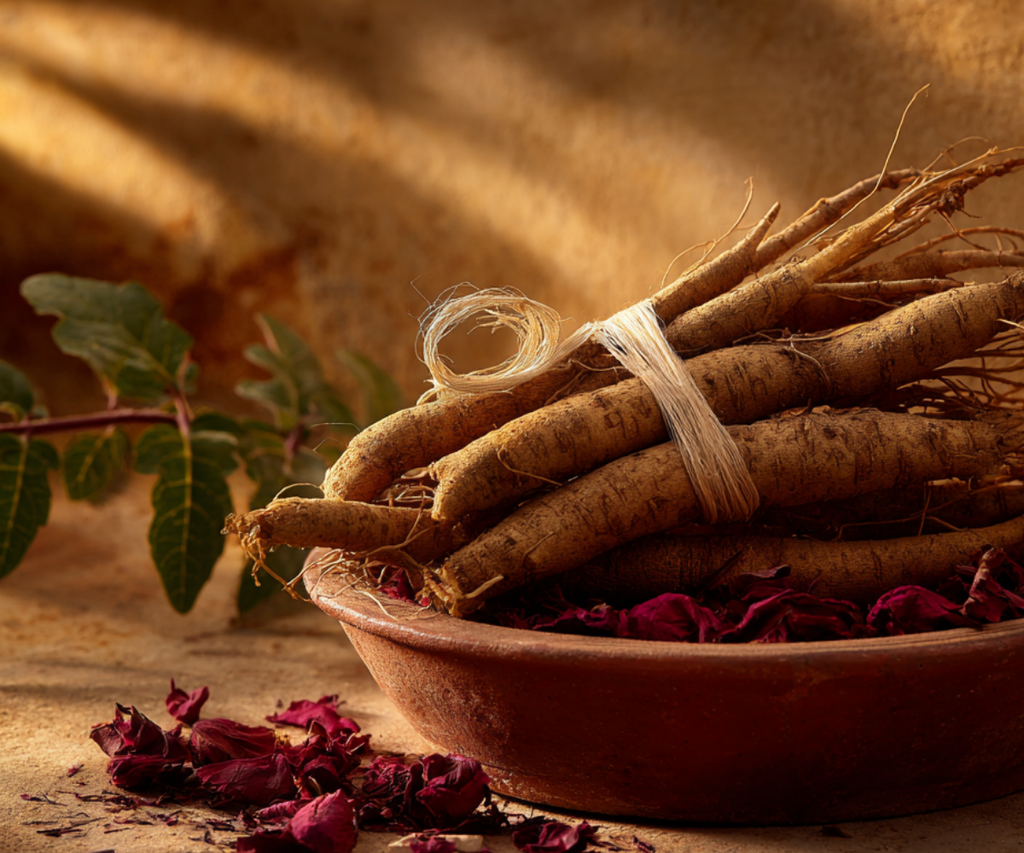Shatavari: The Queen of Ayurvedic Fertility Herbs

In Ayurveda, few herbs hold as much reverence in women’s health as Shatavari (Asparagus racemosus). Literally meaning “she who possesses a hundred husbands,” the name itself reflects the herb’s reputation as a divine feminine tonic—a rejuvenator of reproductive strength, vitality, and hormonal balance.
Used for centuries in India for promoting fertility, menstrual health, and post-natal recovery, Shatavari is Ayurveda’s go-to herb for nearly every stage of a woman’s reproductive life. And now, with growing interest in natural hormone support and fertility optimization, Shatavari is gaining global popularity—not just for its roots in tradition, but for its scientifically backed efficacy.
Shatavari in Ayurveda: Nurturer of the Feminine System
Shatavari is described in classical Ayurvedic texts as a:
-
Rasayana – rejuvenating tonic
-
Stanyajanana – galactagogue (enhances breast milk)
-
Balya – strength-promoting
-
Pittashamaka – pacifier of Pitta (heat and inflammation)
-
Shukral – supporter of reproductive fluids
It nourishes the Artava dhatu (female reproductive tissue) and is traditionally used in:
-
Vandhyatva (infertility)
-
Nashtartava (absent or irregular menstruation)
-
Yoniroga (uterine and vaginal disorders)
-
Daurbalya (general weakness)
-
Garbha sthapana (uterine support during early pregnancy)
The herb's soothing, building, and hormone-modulating actions make it the most recommended Ayurvedic herb for preconception care, pregnancy support, postpartum recovery, and menopause.
🧬 Active Constituents and Therapeutic Actions
Shatavari roots contain:
-
Steroidal saponins (Shatavarins I–IV) – estrogenic action
-
Isoflavones and alkaloids – hormone support and mood balance
-
Mucilage – cooling and lubricating for tissues
-
Polysaccharides – immune-regulating and anti-inflammatory
These compounds give Shatavari a phytoestrogenic effect, meaning it mimics estrogen gently, helping regulate cycles, ovulation, and fertility—especially during times of hormonal fluctuation or depletion.
Shatavari for Female Fertility: A Multi-Layered Approach
Hormonal Balance & Menstrual Regulation
Shatavari has been shown to support estrogen production, balance FSH and LH levels, and encourage regular ovulation. It is particularly beneficial in cases of:
-
Irregular or absent periods
-
Hormonal imbalance due to stress or PCOS
-
Low estrogen levels (e.g., due to over-exercise, age, or weight loss)
It helps the body recalibrate naturally—without forcing hormones or suppressing symptoms.
Uterine and Endometrial Health
As a uterine tonic, Shatavari strengthens and nourishes the endometrial lining, preparing the womb for conception. It improves implantation potential and is commonly used in women with luteal phase defect, thin lining, or repeated implantation failure.
Its anti-inflammatory action helps soothe pelvic congestion, endometrial inflammation, or vaginal dryness.
Stress & Emotional Resilience
Chronic stress is a major factor in cycle disruption and infertility. Shatavari acts as an adaptogen, helping reduce cortisol levels and promote emotional stability. This indirectly enhances fertility by restoring the mind-body reproductive axis.
Women with burnout, anxiety, or mood swings related to PMS or hormonal dips may find remarkable improvement with regular use.
Preconception, Pregnancy & Postpartum Use
-
In preconception, it prepares the reproductive system for ovulation and implantation.
-
During pregnancy, it supports the uterus and reduces risk of miscarriage (under supervision).
-
In postpartum recovery, it helps build strength, balance hormones, and enhance lactation.
Its galactagogue effect is especially revered in Ayurveda, making it a cornerstone in postnatal formulas.
📚 Scientific Backing
Shatavari’s actions have been supported by multiple clinical and pharmacological studies:
-
Phytoestrogenic Activity: A study published in the Journal of Ethnopharmacology found that Shatavari root extract showed significant estrogenic activity, supporting its use in hormonal imbalances and reproductive disorders.
-
Ovarian Function: A study in Pharmaceutical Biology (2011) demonstrated that Shatavari helped normalize ovarian hormone levels in women with polycystic ovarian symptoms.
-
Anti-inflammatory and Immunomodulatory Effects: Its polysaccharides support immunity and reduce pelvic inflammation—often linked to subfertility.
-
Lactation Support: In a randomized clinical trial, women taking Shatavari showed increased breast milk production compared to placebo.
Male Fertility Benefits
Though primarily used for women, Shatavari also supports male reproductive health, especially in cases of:
-
Low libido due to stress or fatigue
-
Weak semen quality
-
Inflammation of the reproductive tract
It is often combined with Ashwagandha or Kapikacchu in male fertility formulations, especially where emotional exhaustion and low stamina are involved.
💊 Dosage and Traditional Usage
Shatavari is traditionally administered as:
-
Churna (powder) – 3–5 grams daily with warm milk or ghee
-
Ghan vati (tablet) – 250–500 mg twice daily
-
Asava or kwatha – decoctions for deeper tissue nourishment
It is often taken over 2–3 menstrual cycles to see substantial effects on fertility and hormonal balance.
⚠️ Safety & Precautions
Shatavari is considered safe for long-term use in most individuals. However:
-
Women with estrogen-sensitive conditions (like fibroids or estrogen-receptor breast cancer) should consult a practitioner.
-
It is best avoided in active respiratory congestion or high Kapha states, unless balanced with drying herbs.
Mild side effects like bloating may occur in sensitive individuals due to its nourishing and mucilaginous properties.
🌾 Final Words
Shatavari is not just a fertility herb—it’s a holistic women’s wellness tonic that touches every aspect of the reproductive system. From regulating ovulation and nourishing the uterus to calming emotional stress and supporting postnatal recovery, it offers a complete botanical toolkit for women at every phase of their reproductive life.
With both classical reverence and growing scientific support, Shatavari continues to earn its place as the Queen of Ayurvedic herbs—restoring fertility not just through the body, but through the balance of mind, hormones, and inner vitality.


Leave a comment